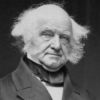Martin Van Buren

Martin Van Buren
Martin Van Buren; December 5, 1782 – July 24, 1862) was an American politician who served as the eighth President of the United States. A member of the Democratic Party, he served in a number of senior roles, including eighth Vice Presidentand tenth Secretary of State, both under Andrew Jackson. Van Buren's inability as president to deal with the deep economic depression following the Panic of 1837 and with the surging Whig Party led to his defeat in the 1840...
NationalityAmerican
ProfessionUS President
Date of Birth5 December 1782
CityKinderhook, NY
CountryUnited States of America
It seems proper, at all events, that by an early enactment similar to that of other countries the application of public money by an officer of Government to private uses should be made a felony and visited with severe and ignominious punishment.
The connection which formerly existed between the Government and banks was in reality injurious to both, as well as to the general interests of the community at large.
The case of the Seminoles constitutes at present the only exception to the successful efforts of the Government to remove the Indians to the homes assigned them west of the Mississippi.
With respect to the northeastern boundary of the United States, no official correspondence between this Government and that of Great Britain has passed since that communicated to Congress toward the close of their last session.
To avoid the necessity of a permanent debt and its inevitable consequences, I have advocated and endeavored to carry into effect the policy of confining the appropriations for the public service to such objects only as are clearly with the constitutional authority of the Federal Government.
In a government whose distinguishing characteristic should be a diffusion and equalization of its benefits and burdens the advantage of individuals will be augmented at the expense of the community at large.
In time of peace there can, at all events, be no justification for the creation of a permanent debt by the Federal Government. Its limited range of constitutional duties may certainly under such circumstances be performed without such a resort.
The less government interferes with private pursuits, the better for general prosperity.
The government should not be guided by Temporary Excitement, but by Sober Second Thought.
I am more than ever convinced of the dangers to which the free and unbiased exercise of political opinion - the only sure foundation and safeguard of republican government - would be exposed by any further increase of the already overgrown influence of corporate authorities.
For myself, therefore, I desire to declare that the principle that will govern me in the high duty to which my country calls me is a strict adherence to the letter and spirit of the Constitution as it was designed by those who framed it.
Mutual forbearance and reciprocal concessions: thro' their agency the Union was established - the patriotic spirit from which they emanated will forever sustain it.
The people under our system, like the king in a monarchy, never dies.
No evil can result from its inhibition more pernicious than its toleration.